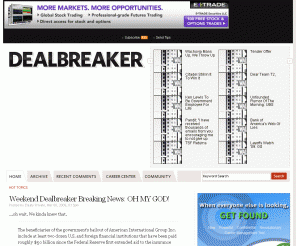
Greece Sells Low, Buys High
Here is a thing that might be worth considering about this here Greek bond buyback:
Κανείς δεν πληρώνει περισσότερο για να αγοράσει αυτά τα ομόλογα, από ότι η Ελλάδα.
Τουλάχιστον, όχι σε χρήμα. Μερικοί άνθρωποι καταβάλλουν για αυτά, πόνο.
Τουλάχιστον, όχι σε χρήμα. Μερικοί άνθρωποι καταβάλλουν για αυτά, πόνο.
Τώρα η Ελλάδα προσφέρει 30 με 40 σεντς στο δολάριο για τα ομόλογα. Τα hedge funds που τα αγόρασαν για λιγότερο από ό, τι αυτό, φαίνονται ευτυχή.
Αφού η Ελλάδα δηλώνει λιγότερο απεγνωσμένη πια και ότι υποστηρίζεται περισσότερο απ την τρόικα, γιατί θα πρέπει να δέχεται αυτές τις τιμές;
Δείτε από την πλευρά του επενδυτή: αν δηλαδή πήρατε την αρχική ελληνική τιμή, για τα παλιά ομόλογα σας, μέχρι τώρα, βγάζετε περισσότερο απο 25-26 λεπτά ανα δολάριο.
Το οποίο υποθέτουμε είναι καλό πράγμα για εσάς.
Δείτε περισσότερα:
VIDEO.WSJ.Είναι αλήθεια,τα Funds αγοράζουν Ελλάδα, με 20 σεντς το δολάριο, περιμένοντας νεο PSI
That’s the entire history of the shortest-dated of bonds targeted for a buyback at, you might notice, their all-time high price. Various people have various reactions to this but one reaction that no one can have is of the variety of “well, I paid more than that to buy it, so I’m not selling it to you for less, since I live in a non-mark-to-market dreamworld.” Nobody paid more to buy these bonds than Greece is planning to.
At least, not in money. Some people paid for these bonds in suffering; others – most others – paid for them in the form of old Greek bonds, which once upon a time were, I guess, worth 100 cents on the dollar. Later, they weren’t. Eventually they were rounded up in a restructuring where every €1,000 of old bonds got exchanged into €315 face amount of new bonds, €150 face amount of let’s say par-ish EFSF notes, and €315 face amount of Greek GDP-linked securities which were worth around nothing. The total package was worth around €210-250, depending on what day you looked at it, which if you do the math assuming the EFSF bonds were worth par and the GDP warrants zero, gets you a value for those new bonds of €60-100, or 19 to 32 cents on the dollar of face amount.
Now Greece is offering 30 to 40 cents on the dollar for those bonds. Hedge funds who bought them for less than that seem happy; Greek hold-to-maturity banks are grumbly about being forced into the offer, though for no discernibly good reason. Here you can fiddle with calculations of how much Greece will save by doing this buyback.
Here you can look at additional fiddling, which does various lazy simplifying things but makes the point that if instead of offering new Greek bonds way back in the olden days of March, the Greece/Troika entity had offered this deal, they could have retired about €40ish billion of debt, rather than the €29-31ish billion they’re targeting today.
Anyway, for your consideration. (Also consider: looking at that table, why would Greece buy in any of its shorter-dated bonds? It’s paying both a higher dollar price and a higher yield for the bonds maturing in the 2020s; the higher dollar price means less “debt sustainability” bang for your buck, while the higher yields will look silly if Greece ever gets back to normal and its yield curve un-inverts. Are they trying to buy roughly equal amounts of each bond to appease the buy-and-hold investors who own the whole strip, or will they end up weighting this toward the back end?)
Obviously the dynamics have changed: that graph at the top of this post pretty much stands for the proposition “when you go around saying you’re going to buy up your debt, your debt gets more expensive.” But as someone who is generally a big believer in can-kicking, I find the math, and the overall shape of that chart, somewhat sobering. Greece hit bottom, more-or-less defaulted on its debt, and now … is coming back to ask for more. On worse terms, which makes sense: with Greece looking less desperate and more Troika-supported, why should you sell it back its bonds at a steep discount?
I guess you can look at it from the investor’s perspective: if you took the original Greek exchange, you thought you were getting 23 cents on the dollar for your old bonds (and your CDS paid out ~78.5 cents); if you held from now until then it turns out you’re getting more like 25-26 cents of value. (Plus maybe those GDP warrants will pay off?) Which I guess is a good thing: it’s always easier to get investors to take the next deal if they made out well on the last one. Perhaps this sell-low-buy-high strategy is smart in the long run.
http://dealbreaker.com/2012/12/greece-sells-low-buys-high/

Δεν υπάρχουν σχόλια:
Δημοσίευση σχολίου
Σημείωση: Μόνο ένα μέλος αυτού του ιστολογίου μπορεί να αναρτήσει σχόλιο.